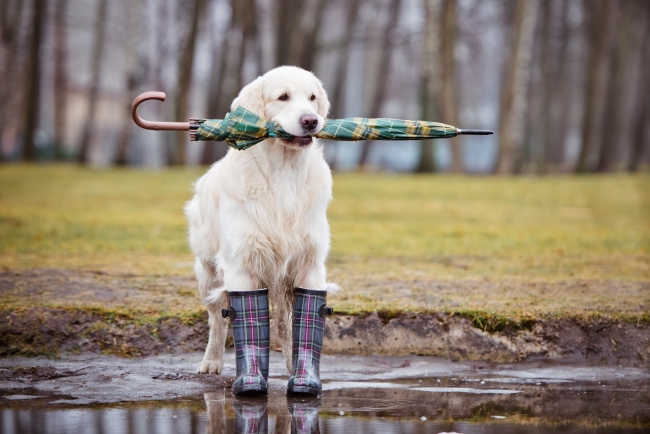
There is a wealth of wives’ tales and myths about dogs and their special abilities. Though some of these may be unfounded superstitions, many of the most impressive facts about dogs are actually true. Their noses are legendarily able to detect the most subtle distinctions in scent, and they are able to hear sounds we cannot. If your dog starts behaving oddly by shaking, twitching, barking or pacing, he might be trying to tell you that there is a tempest brewing. Even if many disbelieve that a dog would be capable of detecting oncoming storms, scientific proof about canine senses ought to dispel any such notion.
How Dogs Detect Storms
- Scent: There are certain tell-tale signs of rain storms that even humans pick up on. For example, have you ever walked out on your porch in the late afternoon said “smells like rain is coming?” That earthy, wet scent with a flicker of sweetness tells us that moisture is in the air, and showers might be headed this way. If we can observe that, then dogs whose smelling abilities leave human noses in the dust, can sense the onset of rain by fragrances we may not be aware of. Some have striven to prove that dogs can smell fear based on subtle odors and pheromones emitted through sweat glands, and we know dogs can track an obscure scent for hours, or remember odors years and years after their first encounter. This should affirm that even on the clearest of days, if our dog seems to suspect a deluge, his nose is a reliable resource.
- Sounds: Canine ears are able to move independently from each other, absorbing depth and spatial information, as well as detecting noises we cannot. Their ears are able to identify nearly twenty times the sounds we are, since their range of frequency reception is far more complex and capable. While we can hear the low rumblings of thunder when it is decently close by, a dog will note them long before we do.
- Pressure: Atmosphere heat, temperature and compression all change before a storm arrives. With their heightened sense and natural survival instincts, dogs are more in-tuned with the barometric pressure than people are. Used to hunting prey, tracking scents, and taking careful note of their surrounding environment, dogs are designed to read weather warnings in messages that often escape us. For humans, the fluctuations in barometric pressure might induce headaches and dizziness, while others might feel old injuries or aches, and moods might go sour. This is about as close as we come to interacting with the barometric pressure, which dogs can read like a manual.
- Feelings: Some researchers believe that minor vibrations in the earth occur when fierce windstorms, tornadoes (and obvious earthquakes) can be sensed by a dog’s paws. The slightest tremor or shockwave felt by their paws, coupled with the confirmation of other senses being piqued, could tip the dog off about the storm.
Signs and Pre-Storm Warnings
Every dog is different in how they choose to communicate, but several of the major warning signs stay the same. Before a storm, some dogs will start unusual behaviors like nervously biting their paws, panting even in cooler weather, pacing around the room, whining, shaking, or drooling. Some dogs rush to bury their toys, treats or bones as a protective measure, others burrow under the pillows and blankets, and some head right for their “den” to take cover. Others become frantic, barking, pawing, and staying close by (even sitting on) their human for comfort. If your pup starts doing any of these things for no reason you can see –look out! A storm might be gather around the corner, and your dog may be trying to warn you.
Fun Fact
An army lieutenant named H.H.C Dunwoody wrote in his 1883 publication called Weather Proverbs, that people should be able to predict an impending storm based on the behavior of a cat. His book describes that cat’s sneezing shows rain is nigh, snoring indicates blustery days and bad weather, and that rain will follow when a cat licks her paws and then rubs them behind her ears. Should a cat groom her face while standing with her back to the fire, that means there will be a warm spell in the wintertime! Whether or not anyone regarded these as even remotely factual, it certainly is an amusing piece of little-known history!

